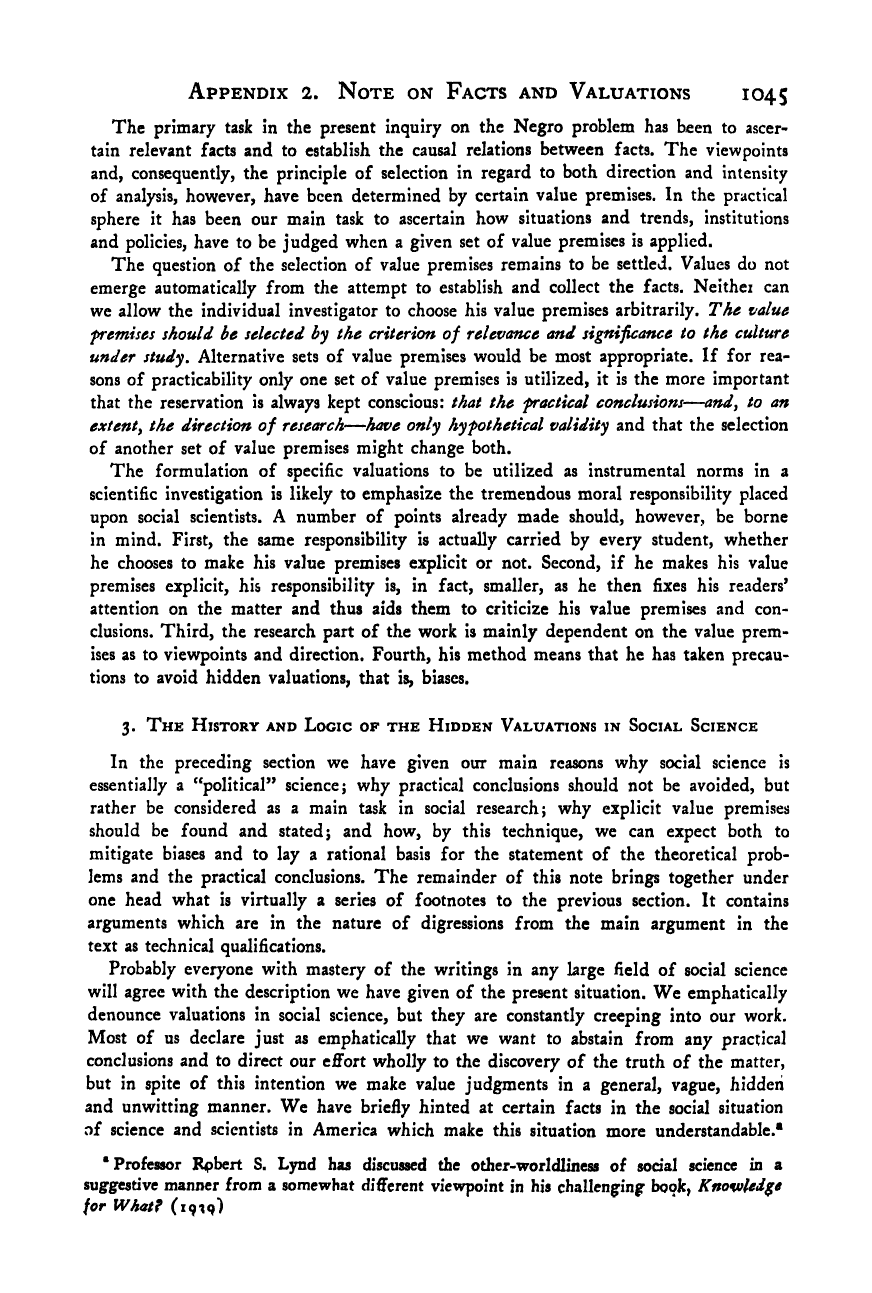Note: Gunnar Myrdal died in 1987, less than 70 years ago. Therefore, this work is protected by copyright, restricting your legal rights to reproduce it. However, you are welcome to view it on screen, as you do now. Read more about copyright.
Full resolution (TIFF) - On this page / på denna sida - Appendices - 2. A Methodological Note on Facts and Valuations in Social Science - 2. Methods of Mitigating Biases in Social Science - 3. The History and Logic of the Hidden Valuations in Social Science

<< prev. page << föreg. sida << >> nästa sida >> next page >>
Below is the raw OCR text
from the above scanned image.
Do you see an error? Proofread the page now!
Här nedan syns maskintolkade texten från faksimilbilden ovan.
Ser du något fel? Korrekturläs sidan nu!
This page has never been proofread. / Denna sida har aldrig korrekturlästs.
Appendix 2. Note on Facts and Valuations 1045
The primary task in the present inquiry on the Negro problem has been to ascer-
tain relevant facts and to establish the causal relations between facts. The viewpoints
and, consequently, the principle of selection in regard to both direction and intensity
of analysis, however, have been determined by certain value premises. In the practical
sphere it has been our main task to ascertain how situations and trends, institutions
and policies, have to be judged when a given set of value premises is applied.
The question of the selection of value premises remains to be settled. Values do not
emerge automatically from the attempt to establish and collect the facts. Neithei can
we allow the individual investigator to choose his value premises arbitrarily. Th^ value
fremises should he selected by the criterion of relevance and significance to the culture
under study. Alternative sets of value premises would be most appropriate. If for rea-
sons of practicability only one set of value premises is utilized, it is the more important
that the reservation is always kept conscious: that the practical conclusions—and^ to an
extent^ the direction of research—Junte only hyfothetical validity and that the selection
of another set of value premises might change both.
The formulation of specific valuations to be utilized as instrumental norms in a
scientific investigation is likely to emphasize the tremendous moral responsibility placed
upon social scientists. A number of points already made should, however, be borne
in mind. First, the same responsibility is actually carried by every student, whether
he chooses to make his value premises explicit or not. Second, if he makes his value
premises explicit, his responsibility is, in fact, smaller, as he then fixes his readers’
attention on the matter and thus aids them to criticize his value premises and con-
clusions. Third, the research part of the work is mainly dependent on the value prem-
ises as to viewpoints and direction. Fourth, his method means that he has taken precau-
tions to avoid hidden valuations, that is, biases.
3. The History and Logic of the Hidden Valuations in Social Science
In the preceding section we have given our main reasons why social science is
essentially a “political” science; why practical conclusions should not be avoided, but
rather be considered as a main task in social research; why explicit value premises
should be found and stated; and how, by this technique, we can expect both to
mitigate biases and to lay a rational basis for the statement of the theoretical prob-
lems and the practical conclusions. The remainder of this note brings together under
one head what is virtually a series of footnotes to the previous section. It contains
arguments which are in the nature of digressions from the main argument in the
text as technical qualifications.
Probably everyone with mastery of the writings in any large field of social science
will agree with the description we have given of the present situation. We emphatically
denounce valuations in social science, but they are constantly creeping into our work.
Most of us declare just as emphatically that we want to abstain from any practical
conclusions and to direct our effort wholly to the discovery of the truth of the matter,
but in spite of this intention we make value judgments in a general, vague, hidden
and unwitting manner. We have briefly hinted at certain facts in the social situation
of science and scientists in America which make this situation more understandable.*
* Professor Rpbert S. Lynd has discussed the other-worldliness of social science in a
suggestive manner from a somewhat different viewpoint in his challenging book, Knovsledge
for Whatf (z9‘i9)
<< prev. page << föreg. sida << >> nästa sida >> next page >>